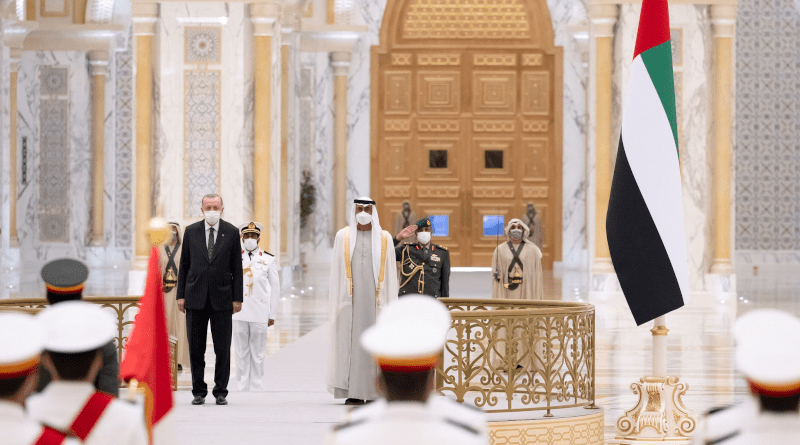Turkey-UAE Rapprochement Grows Under Security Umbrella – OpEd
By Arab News
By Sinem Cengiz*
The Arab Gulf states have historically sought to build partnerships with regional countries through defense and security agreements. In terms of defense cooperation, Turkiye has been getting back into the picture in the Gulf region since last year. Turkish-Gulf defense, security and military cooperation comes after years of rivalry between Ankara and some of the Gulf leaderships. The normalization era between Turkiye and the Gulf countries has not only led to deals of investment and currency swaps, but it has also paved the way for closer security and defense collaboration.
Turkish Interior Minister Suleyman Soylu, along with his entourage, this week paid an official visit to Abu Dhabi, where he came together with his Emirati counterpart, Sheikh Saif bin Zayed Al-Nahyan, and UAE President Sheikh Mohammed bin Zayed Al-Nahyan. A discussion on enhancing cooperation in the police and security fields between the two countries was on the agenda. In this regard, the two interior ministers announced they had decided to establish a “Joint Strategic Policing Dialogue.”
Soylu described the mechanism as exemplary, adding that it set an example for other countries in the region. “With this agreement, an understanding that ensures the security of both our citizens and tries to follow up the crime and criminal elements will be evaluated jointly. At the same time, our competencies will be shared with each other … We already have an ongoing security cooperation agreement process. I hope we will have completed it on one occasion in the near future,” he added.
In February, Turkiye and the UAE inked 13 agreements, one of which was to start holding bilateral defense industry cooperation meetings. Ankara and Abu Dhabi had already signed a memorandum of understanding on defense industry cooperation in 2011 and this was ratified in 2017. However, tensions between the two countries in the years after the ratification of the memorandum of understanding interrupted the cooperation process.
Now, the two countries hope to leverage their rapprochement to counter their common security and economic challenges. In September, the UAE received the first batch of armed drones that it ordered from Turkiye as part of their fast-improving relations. The UAE reportedly received 20 armed drones, marking the first shipment of the 120 Bayraktar TB2 drones it wants to buy from Turkiye.
The shipment came only eight months after Ankara and Abu Dhabi reconciled and restored relations. Although Tawazun, the Emirati defense and security acquisitions authority, and Turkiye’s Baykar Defense, which manufactures the renowned Bayraktar TB2 drone, had discussions over possible cooperation in March 2021, this development has surprised many due to both its timing and content.
The talks continued as Emiratis showed their intention to spend $2 billion on the 120 TB2 drones, along with ammunition, command and control units, and training. The timing of the shipment also came amid the allegations of Sedat Peker, an exiled Turkish mafia leader based in the UAE, against figures close to the Ankara leadership. Within this context, Soylu’s recent visit increased speculation that the agreement signed with the UAE might pave the way for the extradition of Peker, who had previously attacked the Turkish interior minister, back to Turkiye.
The UAE is not the only country in the region that has fixed its eyes on acquiring Baykar’s drones. After their impact on the conflicts in Syria, Ukraine and Libya, international demand for Turkish drones has rocketed. Libya was one of the regional theaters in which Turkish and Emirati interests collided. However, the reconciliation with Ankara has led the Gulf countries to once again turn their focus toward their long-standing enemy: Iran.
The primary reason for the UAE and the other Gulf countries to acquire the Turkish drones is reportedly to counter the growing security challenges from Iran and its proxy groups in the region. They consider the Turkish drones as a significant force that could outperform Iranian drones. The expansion of the Iran-backed Shiite militias in the region’s theaters is not only posing a threat to the Gulf countries, but also to Turkiye, particularly in Syria and Iraq. The counterbalancing of Iran’s growing influence in the region and a common agenda for the creation of a Middle East nuclear weapons-free zone drive the Turkish-Gulf collaboration to a certain degree.
For many decades, the security of the Gulf countries had been sustained by Western deals. Although they continue to stay largely dependent on US weaponry, the Gulf countries have also recently sought to benefit from Turkiye’s military expertise and power. With instability growing in this volatile region, the shifts in threat perception and the security orientation have pushed the Gulf countries and Turkiye to consolidate their political and economic relations through security and defense collaboration.
- Sinem Cengiz is a Turkish political analyst who specializes in Turkiye’s relations with the Middle East. Twitter: @SinemCngz

